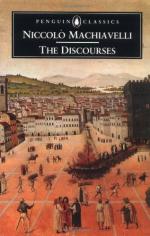
|
| Name: _________________________ | Period: ___________________ |
This test consists of 15 multiple choice questions and 5 short answer questions.
Multiple Choice Questions
1. In Book 3, Section 25, what does Machiavelli repeat to be the most useful thing to establish in a Republic?
(a) Women's rights.
(b) Universal suffrage.
(c) Public mechanisms for delivering benefits.
(d) That its Citizens are to be kept poor.
2. How many commanders does Machiavelli advise over an army?
(a) One for each division.
(b) One for battle and one for negotiation.
(c) A tribunal.
(d) One.
3. According to Machiavelli, what is the sign of a truly powerful Republic?
(a) It can intimidate other Cities to become part of it without fighting battles.
(b) It has the wealth to buy other lands.
(c) It does not take land or gain support with money, but through the virtue of its army and war.
(d) It has the diplomatic skill to cajole the support of other Republics.
4. What does Machiavelli recommend that prudent men avoid?
(a) Idleness and peace.
(b) Deceit and war.
(c) Threatening and injuring anyone with words.
(d) Corruption and lies.
5. What knowledge is necessary for a Captain to be successful?
(a) The knowledge of the enemy.
(b) The knowledge of deception.
(c) The knowledge of sites (geography).
(d) The knowledge of tactics.
6. To whom did Machiavelli refer to demonstrate the value of poverty on the character of leadership?
(a) Cincinnatus.
(b) Brutus.
(c) Claudius.
(d) Caesar.
7. What does Machiavelli cite as Aristotle's three causes of ruin women bring on tyrants.
(a) The demands women make for wealth, food, and houses.
(b) Their seduction of tyrants, distracting their focus, and softening them with parental duties.
(c) The influence women have on men, children and families.
(d) Injury tyrants commit on women either by seduction, violence or corruption of marriages.
8. Why does Machiavelli consider the public a better judge than Princes for who should occupy public offices.
(a) Because the public is guided by what others say of a candidate beyond publicly known acts.
(b) Because Princes play favorites.
(c) Because Princes are too easily distracted by women.
(d) Because the public is swayed by true Nobility.
9. What does Machiavelli recommend as the three ways to restore a divided city?
(a) Kill the leaders, conscript the men to the military, take the women into slavery.
(b) Build a wall between the combatants, place soldiers between their neighborhoods, and prevent them from passing among each other.
(c) Dividing the city's wealth among the factions, sending them to colonies, conscripting them to the military.
(d) Kill the leaders of tumults, remove them from the city, or have them make peace.
10. What, according to Machiavelli, determines whether or not a Republic falls into tyranny.
(a) The corruption of its Nobles.
(b) The absence of its military.
(c) The weakness of its Princes.
(d) The reputation of its Citizens.
11. Who were the two Roman Consuls whose tactics Machiavelli compares as an example of how Princes can take what belongs to another?
(a) Fabius and Junius.
(b) Decius and Fabius.
(c) Claudius and Brutus.
(d) Decius and Octavius.
12. How does Machiavelli advise a Captain to consider a tactical error by an enemy?
(a) The time to strike with all strength.
(b) Cautiously as it is probably a deception.
(c) Good fortune as it foretells victory.
(d) The time to draw the enemy into the open.
13. What does Machiavelli claim causes disunity in a Republic?
(a) Idleness and peace.
(b) Fortune and leisure.
(c) Corruption and war.
(d) Wealth and industry.
14. What type of person does Machiavelli advise against promoting to important positions in a Republic?
(a) Anyone who has been done a notable injury by someone.
(b) Anyone who has killed a rival.
(c) Anyone who has avoided war.
(d) Anyone who is ambitious.
15. Of what is Machiavelli referring when he addresses the use of deceit in managing wars?
(a) Fooling the Senate to put him where he can win.
(b) Fooling the city he attacks to hide in a fort.
(c) Fooling his soldiers to do things he needs.
(d) Using tactics that mislead the enemy in battle.
Short Answer Questions
1. According to Machiavelli, what prevented the ambitions of the Nobles from corrupting Rome?
2. Why does Machiavelli claim that Princes should not complain of faults of People under their authority?
3. Why would corrupt Republics accept common deceptions?
4. What finally forced Phillip into battle with Fabius, according to Machiavelli?
5. Why does Machiavelli suggest that Republics arrive to changing with the times later than individuals?
|
This section contains 852 words (approx. 3 pages at 300 words per page) |

|




